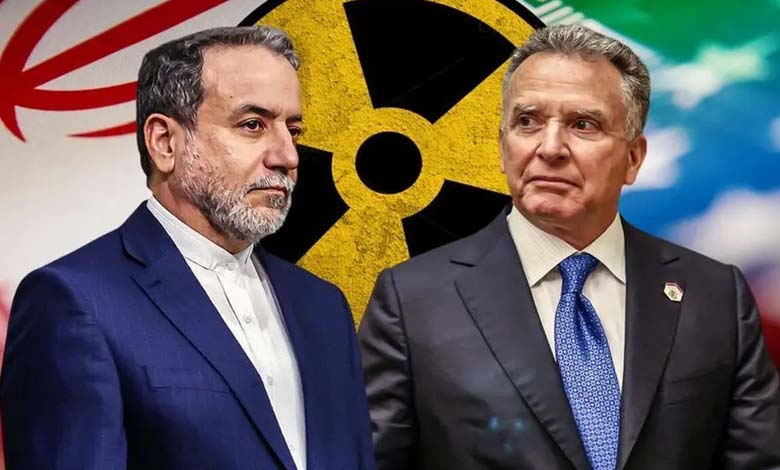In the Third Round… Nuclear Talks Return to Muscat with Possible Extension

Nuclear talks between Iran and the United States have returned to the Omani capital for a third round, which “could be extended if necessary.”
On Saturday, the third round of nuclear negotiations began in Muscat, according to Iranian state media, after both sides reported progress during recent meetings in Rome.
Iranian state television stated that “the third round of indirect talks between Tehran and Washington kicked off on Saturday in Muscat, the capital of Oman.”
-
Are the UAE Playing a Mediation Role Between Iran and the United States?
-
New sanctions imposed by the United States, Britain, and Canada on Iranian officials… Details
Extension Possible
On the same day, Iranian official media reported that the third round of talks in Oman could “be extended if necessary,” with the two countries first engaging in technical discussions at the expert level before holding high-level negotiations.
The official Iranian news agency IRNA said, “This round of negotiations, like the two previous ones, is scheduled to last one day.”
It added, “However, since the negotiations will focus on technical issues and the examination of details, an extension remains possible if needed.”
-
Iran warns Israel and the United States of “escalation beyond control”
-
New Talks – United States and Iran Revive Nuclear Agreement Negotiations Once Again
Off the Table
Iranian Foreign Ministry spokesman Esmail Baghaei confirmed on Saturday that Iran’s defense and missile programs are not on the agenda during nuclear talks with the United States.
Speaking to state television, he said, “Iran’s defensive and missile capabilities are not under discussion and were not brought up in the indirect talks with the United States.”
These meetings, mediated by Oman, follow two previous rounds of indirect negotiations: the first held on April 12 in Muscat and the second on April 19 in Rome.
-
The United States will sanction more than two dozen people and entities about Iran’s nuclear
-
Nuclear Negotiations: U.S. Red Lines and Iran’s Firm Response
This represents the highest level of contact between the two countries, which have had no diplomatic relations since 1980, following former U.S. President Donald Trump’s unilateral withdrawal from the 2015 nuclear agreement in 2018.
The talks are led by Iranian Foreign Minister Abbas Araghchi and U.S. Middle East envoy Steve Witkoff, with Omani Foreign Minister Badr Al-Busaidi acting as mediator.
Both Iran and the United States stated that last Saturday’s round of negotiations at the Omani ambassador’s residence in Rome had led to “progress,” and Tehran described the meeting as “good.”
-
U.S. Sanctions Target Iranian Gas and Oil Shipping Tycoon
-
Iran May Accept a Deal Limiting Its Nuclear Program if Trump Doesn’t Withdraw Again
Oman’s Foreign Ministry noted that the Rome meetings “resulted in the parties agreeing to move to the next phase of discussions aimed at reaching a fair, lasting, and binding agreement ensuring Iran is fully free of nuclear weapons, lifting all sanctions, while preserving Iran’s right to develop nuclear energy for peaceful purposes.”
“Hostile” Sanctions
Western countries, including the United States, have long accused Iran of seeking to develop nuclear weapons — a claim Tehran consistently denies, asserting that its nuclear program is strictly for peaceful and civilian purposes.
-
Iran’s Nuclear Program Back in the Spotlight… and Trump Seeks Political Breakthrough
-
Washington Conditions Any New Nuclear Deal with Iran on Enrichment Oversight
This week, Abbas Araghchi reiterated Iran’s stance: “If the only U.S. demand is for Iran not to possess nuclear weapons, this demand is achievable,” adding, “However, if there are other demands — impractical or illogical ones — problems will naturally arise.”
Since returning to the White House last January, Donald Trump has reimposed a “maximum pressure” campaign of sanctions on Iran, continuing his first-term strategy.
Trump stated that the United States would “lead” an offensive against Iran if the nuclear talks failed to yield a new agreement, in an interview published Friday by Time magazine.
-
U.S. Report: Iran Supplies Long-Range Missiles to Iraqi Factions for the First Time
-
In Iran’s Eid Sermon: The U.S. and Israel Present with Warnings
Last March, Trump sent a letter to Iran’s Supreme Leader Ali Khamenei offering negotiations, but also threatening military action if diplomacy failed.
Last Tuesday, Washington announced new sanctions targeting Iran’s oil network — a move Tehran denounced as a sign of a “hostile approach” just ahead of Saturday’s talks in Muscat.












